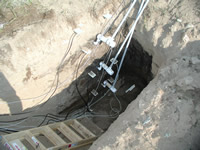Petroleum Related Contamination
|

Soil moisture probes and tensiometers installed in the side of a pit for monitoring a tracer test in the unsaturated zone. Note black oil-contaminated sand on pit walls -- from the Bemidji Site
|
|
Bibliography
|
|
Subsurface spills of petroleum compounds (crude oil, gasoline, and gasoline additives)
may be the most frequently cited cause of ground-water contamination. USGS scientists and
their partners are developing information and tools essential for effective remediation and
long-term management of fuel spills. A major theme of this research is the effectiveness and
practical limitations of Natural Attenuation for treatment of sites with petroleum related
contamination. Research has been conducted at 4 research sites:
Crude Oil Contamination in a
Shallow Outwash Aquifer -- Bemidji, Minnesota
Oxygenated Gasoline --
Laurel Bay, South Carolina
Produced Water -- Osage-Skiatook
Petroleum Environmental Research Project, Oklahoma
Gasoline -- Galloway Township, New
Jersey [Completed]
Other Program Petroleum Related Research
Program Headlines on Petroleum Related Research
Fact Sheets
New Publications
- Response to commentary on Observed methanogenic biodegradation rrogressions: Hostettler, F.D., Bekins, B.A., Rostad, C.E., and Herkelrath, W.N., 2008, Environmental Forensics, v. 9, no. 2-3, p. 121-126, doi:10.1080/15275920802115738.
|

|